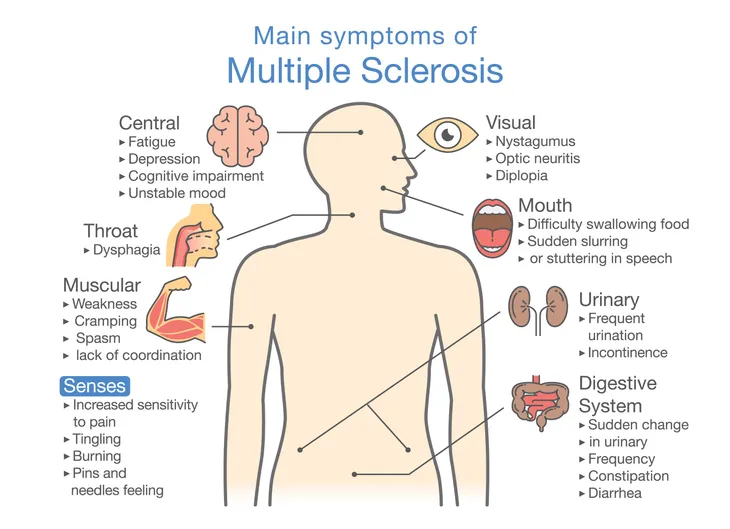In America, approximately 350,000 people have multiple sclerosis (MS), a condition that strikes the central nervous system (CNS), which is made up of the brain, optic nerves, and spinal cord. This is why MS impacts the vision, hearing, memory, balance, speech, and mobility of its victims.
While MS strikes mostly teens and young adults between the ages of 15 and 40, women are three times more likely to develop MS compared to men.
Even though there is no known cure for this complex disease, early diagnosis can prevent further damage, such as total vision loss and paralysis. Here are 14 of the most common signs and symptoms associated with MS…
1. Numbness
First and foremost, MS typically strikes the nerves in the brain and spinal cord. Whenever something affects the spinal cord, it usually causes symptoms elsewhere in the body as well. Because the spinal cord is the body’s “message center,” patients notice numbness when the body isn’t receiving signals from the brain. Tingling and numbness may be felt in areas such as the face, arms, legs, and upper extremities. WebMD describes it as an “electrical shock-like feeling when you move your head or neck. It may travel down your spine or into your arms or legs.”
The source also points out that it’s not a symptom all patients experience. It’s more likely to happen in those who have lesions on their brain from the loss of myelin. Anyone who is diagnosed with MS will undergo magnetic resonance imaging (MRI) to check for lesions on the brain.
2. Decrease in Cognitive Function
Cognitive impairment will affect about 50-percent of MS patients, with patients suffering from issues, such as memory loss, disorganization, inability to focus, and severely reduced attention spans. WebMD writes, “It might be hard to focus from time to time. This will probably mean slowed thinking, poor attention, or fuzzy memory. Some people have severe problems that make it hard to do daily tasks, but that’s rare.”
3. Vision Issues
Another early warning sign and one of the most common symptoms of MS is blurred vision. This is due to the fact that the disease can cause inflammation in the optic nerve (a condition called optic neuritis), resulting in deteriorating vision issues such as blurred vision or eye pain, double vision, color blindness, or loss of contrast in one or both eyes. According to WebMD, vision issues are a result of what’s called clinically isolated syndrome (CIS), which is later diagnosed as MS. WebMD writes, “It happens when your immune system mistakenly tells your body to attack myelin, the protective sheath over nerve cells in your brain and spine.”
Healthline notes that these vision problems might not occur right away, but rather they’ll happen slowly over time. Patients might also notice a pain when they look in a certain direction.
4. Bladder Issues
Incontinence and urinary urgency can often be observed in the early stages of MS, with about 80-percent of patients complaining of the constant feeling to urinate, the need to urinate more frequently, and insomnia due to loss of urinary control. These bladder issues stem from lesions in either the brain or spinal cord, both of which can disrupt how the bladder works because these lesions interfere with the transmission of signals between the brain and bladder. According to Healthline, this symptom is usually easy to manage.
5. Muscle Spasms
MS will often cause chronic pain originating in the leg and back muscles and joints, causing stiffness, involuntary muscle spasms, and painfully embarrassing jerking motions. Healthline quotes a study conducted by the National MS Society that showed half of patients suffering from MS experience chronic pain. “Muscle stiffness or spasms (spasticity) are also common. You might experience stiff muscles or joints as well as uncontrollable, painful jerking movements of the extremities,” says Healthline. It also notes that these pains and spasms are most common in the legs, but can also occur in the back. Muscle spasms are also a symptom of progressive MS. Individuals with MS may experience “mild stiffness, or strong, painful spasms.”
6. Dizziness
MS also affects coordination and balance, resulting in dizziness, lightheadedness, and nauseating vertigo if a person tries to stand up too suddenly or get up quickly from a seated position. Healthline says a doctor might refer to these particular symptoms as causing problems “with your gait,” which is basically just referring to a person’s ability to walk. This can make it particularly hard to get around and keep your balance.
7. Depression
Severe depression is often linked to MS pain. The lack of control over your body and the constant pain can often lead to irritability, mood swings, and moments of uncontrollable crying and laughing (a condition known as the pseudobulbar affect). Similar with any chronic condition, it can be extremely hard for patients to come to terms with the realities of their physical symptoms. There is also an element of fear for the unknown. On top of all that, depression can stem from the stress MS puts on the relationships with family and friends.
WebMD also points out that MS affects the nerve fibers in the brain, which can “affect your emotions.” Other factors that can affect mood are the medications used to treat MS, such as corticosteroids.
8. Fatigue
The majority of MS patients also complain of the sudden onset of fatigue (usually starting in the lower extremities), which leaves them completely drained of energy. This exhaustion will worsen as the nerves gradually deteriorate within the spinal cord. Similar to bladder issues, fatigue affects about 80-percent of MS patients in its early stages. Not only do they experience fatigue but also some will suffer from chronic fatigue. “Chronic fatigue occurs when nerves deteriorate in the spinal column. Usually, the fatigue appears suddenly and lasts for weeks before improving. The weakness is most noticeable in the legs at first,” says Healthline.
Some patients might notice that their fatigue is worse in the afternoons and that it affects more than just their mental state. It slows down their thinking and causes their muscles to go weak. Unlike people who aren’t affected by MS, this type of fatigue isn’t related to the amount of work they are doing in a day, as it can even happen after a full night of sleep.
9. Sexual Dysfunction
Lack or total loss of sexual arousal, particularly for males with MS, will occur due to the fact that sexual stimulation originates in the CNS. MS affects the nerve pathways directly related to healthy sexual function. It can also include women who typically experience vaginal dryness. Both sexes will “be less responsive to touch, have a lower sex drive, or have trouble reaching orgasm,” says WebMD.
10. Speech Problems
While it never gets so bad as to affect your intellect or ability to read or understand conversation, it’s more likely to affect your focus and the speed at which you are able to process information. For example, it might take you longer to respond, or you make long pauses between words. It can also cause nasal or slurred speech. WebMD says in rare cases when the symptoms are especially bad, it’ll be hard to perform daily tasks, but this is unlikely. As the disease progresses, some patients might experience difficulty swallowing.
11. Unusual Sensations
Individuals with MS not only experience muscle spasms and numbness (which has been covered) but also may experience other unusual sensations such as “itching, burning, stabbing, or tearing pains.” The Multiple Sclerosis Society of Canada says the most common sensation is numbness, but the others listed here can also occur. It typically starts off in one or more limbs and then gradually spreads throughout the body and increases in intensity as it spreads. Arguably, one of the most unusual is referred to as the “MS hug.” Patients who experience this will feel a tightness around their upper belly and ribs. It’s referred to by doctors as dysesthesia.
12. Tremors
In addition to these unusual sensations, MS also commonly causes tremors. WebMD says it occurs in about half of the people with this disease. These tremors can vary in degree, being either minor shakes or be so intense that it makes it hard to accomplish everyday tasks.
13. Heart-Related Problems
Another early warning sign of MS is heart trouble. Someone who exercises regularly might notice they are getting tired earlier in their workout or even while doing just a short warm-up. WebMD says these heart problems can cause fatigue and weakness as well as trouble controlling certain parts of the body such as the foot or leg. What’s strange is that the symptoms will go away as soon as they rest.
14. Bowel Dysfunction
As previously discussed, MS can cause bladder issues, as the lesions on the brain interfere with the transmission of signals between the brain and bladder. Similarly, MS can also affect bowel movements. The Multiple Sclerosis Society of Canada says the most common form of bowel dysfunction in MS patients is constipation, but it can also include diarrhea and incontinence. It goes on to say that constipation is another result of an interruption in the neural pathways.

















